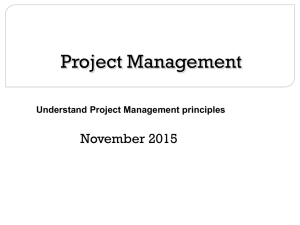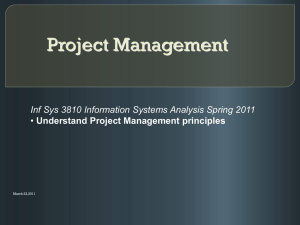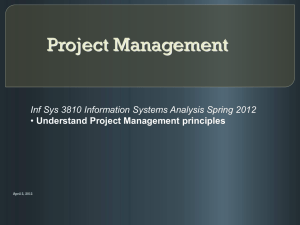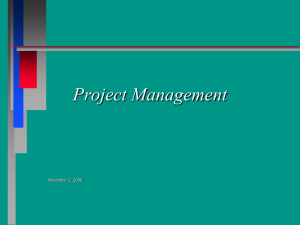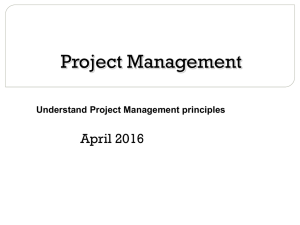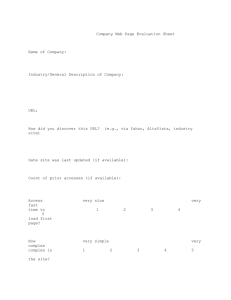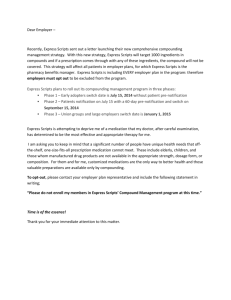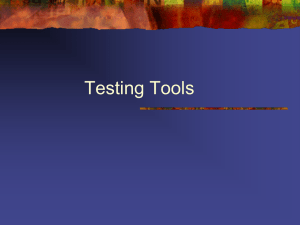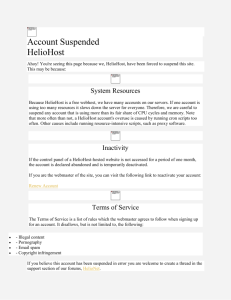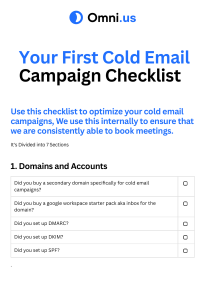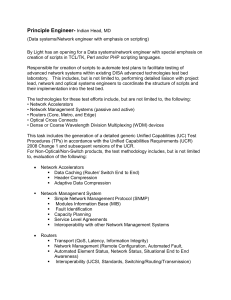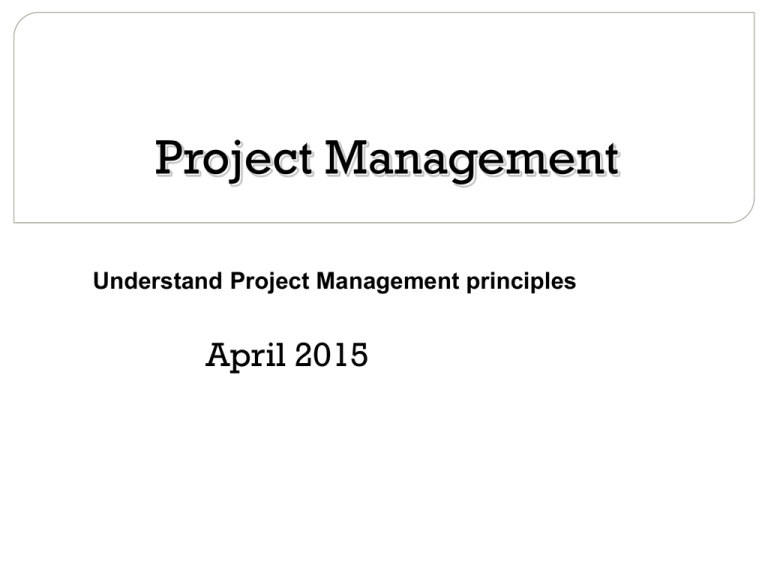
Project Management
• Understand Project Management principles
April 2015
Introduction
Sharyn Lemmons, PMP
Senior Manager - Disaster Recovery Team
Express Scripts, Inc.
Gary Obernuefemann
Business Consultant IV
HP
Making the Use of Prescription Drugs Safer
and More Affordable
90 Million
MEMBERS
3,500
CLIENT S
1.4 Billion
PRESCRIPTIONS PER
YEAR
30,000
EMPLOYEES
National Leader in Pharmacy Benefits
Confidential and Proprietary Information
© 2014 Express Scripts Holding Company. All Rights Reserved.
3
Top of Class Internship Program
Express Scripts Summer Internship Program
Networking
Development
Activities
Executive
Professional Training
Internship
Speaker Series
Buddy Program
Real Work
Summit
Social Event
Volunteer Event
Experience
Formal Evaluations
Final Presentations
Spend your summer with Express Scripts!
Open internships can be found online
at careers.express-scripts.com
keyword search: Intern
Confidential and Proprietary Information
© 2014 Express Scripts Holding Company. All Rights Reserved.
4
Today’s Goal and Agenda
Present Project Management and discuss
the relationship between Analysis and
Design and Project Management
Your Turn
When someone says ‘project’ what
comes to mind?
What is your class project assignment?
What is the hardest thing about your
project?
What has been the biggest surprise so
far about your project?
Project Definition
A project is a temporary endeavor
undertaken to create a unique product or
service.
Project Characteristics
Performed by People
Constrained by Resources
Planned, Executed and Controlled
Temporary and Unique (as opposed to
operations, which are ongoing and
repetitive)
Successful Project
Meets or exceeds the customers
requirements
Delivered on time
Within Budget
Project Management
The application of knowledge, skills, tools,
and techniques to project activities to
deliver a successful project.
Project Management Vs. Project
Methodology
Methodologies give you templates of
things to do
Project management applies them to this
project
The approach\methodology can be
Waterfall, or Iterative, or Agile or ??? But
all need Project Management.
5 Project Stages/Processes
Start Up / Initiating
Planning
Execution
Monitoring and Controlling
Close Down
Project to Development
Relationship Model
Development Life Cycle
PM Stages / Processes
Start-Up / Initiating
Analysis
Planning
Execution
Design
Monitoring
Controlling
Construction
Close-Down
Roles of a Project Manager
Coordinator
Communicator
Leader
Negotiator
Planner
Project Management Functions
Scope Management
Risk Management
Communications Management
Schedule Management
Human Resource Management
Quality Management
Cost Management
Procurement Management
Integration Management
Scope Management
Ensure that the project includes all the
work required, and only the work
required, to complete the project
successfully.
Scope
Have you or can you develop a 3 Sentence
Scope Statement for your project.
If not, what do you need to complete one?
Change Control
Ensure that changes are agreed upon.
Determine when scope change is
desired/has occurred.
Managing the change through all other
processes (schedule, cost, quality).
Risk Management
The process of identifying, analyzing, and
responding to project risk.
Risk is an uncertain event or condition that will
have an effect on the project. It has a cause
and an effect and a consequence to cost,
schedule, or quality.
What is the biggest risk on your project?
Communications Management
Ensure the timely and appropriate generation,
collection, dissemination, storage, and ultimate
disposition of project information.
Who needs to know what? When do they need to
know it? How will it be communicated and by
Whom?
Communications Management
What is your communication plan?
What is the Frequency/Method/Content of
communication with
Dr. Sauter?
The Customer?
Each other?
Schedule Management
Ensure the timely completion of the project.
Identify the specific activities that must be
performed to meet deliverables.
Document dependencies
Estimate the time to complete an activity
Schedule development (start and end dates)
Schedule control
What is the Critical Path/Milestones for your
class project?
Schedule Management
When is your next deliverable due to Dr.
Sauter? The customer?
When is your final delivery due to Dr.
Sauter? The customer?
What is your critical path and who is on it?
Resource Management
Make the most effective use of the people
involved in the project.
Planning
Acquisition
Development
Quality Management
The processes required to ensure the
project will satisfy the needs for which it
was undertaken.
Identify what to measure
Periodically review the project
Monitor specific results to determine if
they meet the relevant quality standards.
Cost Management
Ensure the project is completed within the
approved budget
Procurement Management
Acquire goods and services to attain
project activities from outside the
performing organization.
(aka Vendor Management, Subcontractor
Management, Supplier Management)
Characteristics of Effective
Project Management
Effectively plan the project
Accurately monitor and communicate the
project progress
Ensure that all requirements are met
Ensure the project is on time and within
budget
Schedule resources effectively
Manage changes to the project
What does all this mean to you?
You know what you are supposed to be
working on and when it is due
You know what is going on in the project
You know how to communicate your
status
You know the critical path items and the
critical success factors for the project.
Benefits
Projects delivered on time and within
budget that meet customers
expectations.
No more death marches
Success can be duplicated. Failures can
be learned from.
Return business
INF SYS 6847 : FINANCIAL AND PROJECT
MANAGEMENT
Prerequisite: IS 5800 Management Information Systems
Effective project management ensures that a project is
completed on time, within budget, and has high quality. The
purpose of this class is to examine the task of project
resource management with a focus on IT and services. It will
cover conventional aspects of project management, such as
the project evaluation, planning, roles, responsibilities,
scheduling, and tracking. In addition, this class will examine
risk management, change management, critical chain
management, build vs. buy analysis, package vs. custom
solutions, vendor qualification and selection, and the roles
of certification in the process. The class will also cover the
management of programs or a portfolio of IT projects.
To be successful in PM ...
Using a methodology and working with the
customer, develop a plan and execute it
with defined tools and procedures.
Piece of cake!
Questions/Comments?

